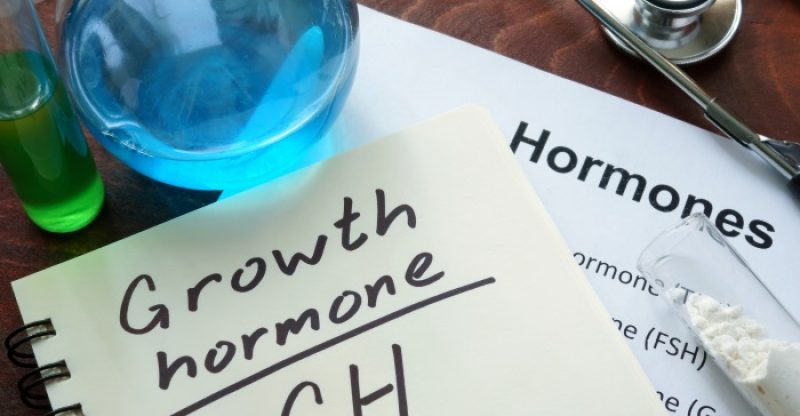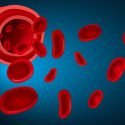8 Evidence-Based Human Growth Hormone (hGH) Benefits
Your body naturally produces human growth hormone, also known as hGH, and this vital regulatory chemical provides many essential health benefits.
While you may have only heard of hGH because of its association with steroid use in athletics, this hormone is naturally produced by your endocrine system and is used to help rebuild cells and tissues.
Our guide shares with you everything you need to know about human growth hormone, including how your body synthesizes it, what happens when you are not producing enough, the critical health benefits of proper hormone regulation, and natural ways to boost your levels of HGH.
Whether you are looking to increase your muscle mass, get a better night’s sleep, improve your libido, or have stronger bones and muscles, human growth hormone can naturally help you meet your health goals.
Produced by the pituitary gland, this hormone plays a crucial role in several metabolic processes, and without it, your health can suffer.
Know how to recognize whether you have sufficient amounts of HGH in your system, and if not, what to do.
What is HGH
Growth hormone is present in nearly all animals. In humans, this type of regulatory chemical is referred to as human growth hormone (HGH), or somatotropin.
HGH stimulates the growth, reproduction, and regeneration of cells in your body, helping you to maintain healthy tissues, muscles, and organs.
Without hGH, growth and development can be severely delayed or stunted, and ongoing repair of damaged tissue would be impossible.
Your pituitary gland, located at the base of your brain, is responsible for producing human growth hormone.
HGH is necessary for the child and adolescent appropriate development, especially during puberty.
Historically, human growth hormone has been prescribed to treat both children with growth disorders and adults with severe deficiencies.
What causes growth hormone deficiency?
A lack of this crucial regulatory hormone in children can be caused by trauma or infection that affects the pituitary gland, a dearth of pituitary hormones, or genetics.
In adults, it can be the result either of a benign tumor on the pituitary gland or the treatment of such a tumor using surgery or radiotherapy.
Doctors and scientists still do not fully understand the complexity of the mechanism by which hGH regulates the many crucial body functions it controls.
Recently, some doctors have begun to prescribe this hormone to older patients who are deficient in it, but the long-term use of synthetic HGH for these purposes has not been sufficiently evaluated.
HGH supplementation came into popularity as an anabolic agent in the 1980s, when it was discovered that athletes were using it to improve muscle mass and build strength quickly.
HGH is now banned from use by nearly all major sporting associations, and with the introduction of more sophisticated testing in the early part of the 21st century, even stricter enforcement of this ban is in effect (1).
How HGH Affects Men and Women
Both men and women produce hGH, but women’s production begins to decline much earlier than that of men.
Most women experience a slowing down in their growth hormone production in their early 20s, while men usually don’t experience this effect until their mid to late 40s.
For women, the effects of lowered growth hormone levels include dry skin, an increase in belly fat, the appearance of wrinkles, and thinning hair.
When women have the appropriate levels of HGH in their system, they are more likely to maintain a healthy body fat ratio, their risk of osteoporosis decreases, and the skin remains more elastic.
For men, decreased hGH can lead to lack of sexual appetite, thinning hair or baldness, memory loss, and muscle weakness.
Growth hormone has a positive impact on the production of testosterone, which can increase energy and strength in men, as well.
Effects of HGH Deficiency
If you are deficient in human growth hormone, your symptoms may vary widely, depending on your age and gender.
Because hGH deficiency is a significant problem in children, knowing the symptoms and signs to watch for in young ones is essential.
Once children reach puberty, the average growth rate can be more than four inches per year, while younger children generally grow between two and two and one-half inches per year after the age of one.
Younger children who are significantly shorter than their peers, or who grow less than two inches per year, may be at risk for an hGH deficiency.
It is important to remember that physical development is entirely different than intellectual or social development.
Children with hGH deficiencies should progress cognitively at the same rate as their peers, and there should be no concern regarding language development or social skills, as these are separate issues from physical growth and development.
If you are concerned about your child’s development, and, more specifically, about a possible lack of hGH, you should also be on the lookout for these other signs, which are common in children with low levels of growth hormone (2):
- Delayed puberty
- Prominent forehead
- Increased fat in the face and abdomen
- Appearing much younger than peers, particularly in the face
- Slow hair growth
Adult symptoms of an HGH deficiency are very different, though.
If you are concerned about your hormone levels, the signs you should be looking for include (3):
- Hair loss
- Depression
- Sexual dysfunction, including low libido, erectile dysfunction, and vaginal dryness
- Loss of muscle mass or strength
- Inability to concentrate
- High levels of serum triglycerides, especially LDL cholesterol
- Memory loss
- Excessively dry skin
- Fatigue
- Sensitivity to temperature changes
- Unexplained weight gain, especially in the midsection
- Insulin resistance
If you have a combination of these symptoms or think you may be experiencing reduced hGH levels, talk with your doctor about your risk factors and possible treatment options.
Health Benefits of HGH
The health benefits of human growth hormone include supporting general recovery, slowing the aging process, and as an adjunct to treatment of specific disorders in all ages.
The following benefits are those most widely-recognized in the scientific literature.
Improves Your Muscle Strength and Mass
Human growth hormone stimulates the synthesis of collagen in your musculoskeletal system.
Collagen provides additional strength and endurance in muscles and tendons, especially during physical activity.
For those who are deficient, increasing levels of this regulatory hormone through long-term replacement therapy has been shown to normalize muscle strength, improve body composition, increase endurance, and improve thermoregulation during physical activity (4).
This benefit is the primary reason hGH is so popular among athletes, and why it has, unfortunately, been abused by those who compete professionally.
Builds Stronger Bones
Human growth hormone is released based on signals sent from the pituitary gland, and is necessary for the growth of bones and muscles, especially during puberty.
Growth hormone is also responsible for stimulating the production of insulin-like growth factor, or IGF-1, produced in the liver.
IGF-1, also known as somatomedin C, has a structure similar to insulin, and also plays a vital role in childhood development (5).
As we age, our production of HGH slows.
This slowing can cause the cells in your bones to deteriorate, as they are no longer regenerated or replaced.
With proper levels of both hGH and IGF-1, your body can produce the appropriate amount of bone-forming and regeneration cells, which can increase your overall bone mass and leave you with stronger bones into your later years.
Heals Fractures Faster
Your body needs several processes to work well for broken bones to heal correctly.
In addition to mineral regulation and bone cell metabolism, you need the right balance of hormones and growth factors to repair a bone break.
Human growth hormone can support the regeneration of a broken bone, making it a helpful substance when you are recovering from an injury.
IGF-1 also helps promote bone healing.
In animal trials, injections of growth hormone at the injury site were shown to improve healing of bone fractures.
The results showed better results for injections at the injury site over general growth hormone injections, indicating that growth hormone may need to be applied more directly in the area of an injury to boost healing (6).
In addition to healing fractures, human growth hormone is necessary to the repair of cells and tissues in muscles, tendons, ligaments, and bones required by normal wear and tear.
As we age and our production of HGH decreases, many experience more injuries and slower healing from minor tears and sprains.
When given growth hormone supplementation for several months, participants in one study saw a decrease in injuries and faster healing of damaged tissue (7).
Decreases Sexual Dysfunction
Recent research indicates a strong link between male reproductive function and growth hormone levels.
Those with hGH deficiencies were more likely to experience erectile dysfunction, lowered libido, and other sexual dysfunction.
Evidence from German researchers suggests that penile erections may be caused by the release of growth hormones, which stimulate the smooth muscle of the penis (8).
In the future, increasing HGH levels could be used as a treatment for erectile dysfunction that is caused by physiological reasons.
Improves Your Weight Loss
Those who are obese could benefit from HGH supplementation in several ways.
First, growth hormones improve the breakdown of lipids in your blood.
This could result in lower serum cholesterol and triglyceride levels, with better production of growth hormone.
Decreasing these has a positive effect on your heart, as reducing lipid levels also improves your heart health.
HGH may also help those who are obese lose weight.
Participants in one research study were able to lose over one and one-half times more weight when they were treated with hGH, compared to those treated with a placebo (9).
Growth hormone’s most significant impact is on visceral adipose tissue, which is the fat that accumulates in the midsection and belly.
This excess fat is also a risk factor for heart disease.
HGH is also known to help increase lean muscle mass, which is useful in promoting weight loss.
Those in the study group who ate a diet low in calories experienced accelerated fat loss, more muscle gain, improved secretion of growth hormones, and enhanced weight loss.
Future research could support the use of hGH in weight loss therapies for the obese.
Decreases Health Problems Related to Obesity
Those who are significantly overweight or obese often experience serious health complications related to their weight.
Insulin resistance is common in the obese, and treatment with growth hormone has been shown to have positive effects on insulin sensitivity.
Resistance to insulin is a precursor to diabetes, so increasing sensitivity to this hormone is an excellent side effect of increased levels of HGH.
Researchers have discovered that, in addition to having less belly fat, people who are obese who are treated with hGH also show a decrease in blood pressure (10).
And, as you lose weight, your production of and sensitivities toward both growth hormone and IGF-1 increase.
With less weight, you are able to use your regulatory hormones more efficiently.
Improves Your Mood and Cognitive Function
For adults with growth hormone deficiencies, hGH therapy may also enhance your mood, psychological well-being, and even your cognitive function.
Participants in one study saw an increase in concentration, memory, and mood with supplementation (11).
It is therefore possible that, with further research, this could become a useful therapy for those experiencing a cognitive decline or mood disorders.
Lowers Your Cardiovascular Disease Risk
Maintaining the proper levels of growth hormone could help your heart stay healthier longer, as well.
Researchers have noted that those who are deficient are more likely to show several risk factors for cardiovascular disease.
These include higher levels of triglycerides, and increased body mass (12).
By regulating your hGH levels, you can reduce your risk for cardiovascular problems and improve your overall heart health.
Natural Methods for Increasing HGH
While taking hGH supplements is strictly controlled by doctors, who may prescribe growth hormone therapy for the treatment of specific diseases, there are ways you can boost your body’s natural production.
The following strategies can increase your production of growth hormone, providing you with the positive health benefits we described.
Get More High-Intensity Exercise
Your growth hormone secretion is regulated by a complicated process involving the release of other regulatory chemicals in your body when you exercise.
After all, growth hormone’s role is to repair muscles, which needs to happen after you use them vigorously.
Engaging in the intense exercise that involves the use of weights and high-intensity movements can prompt your body to produce more growth hormone.
Exercising for at least 10 minutes with an intensity that triggers the release of lactic acid in your muscles will provide the most substantial increase in HGH secretion (13).
High-intensity interval training sometimes referred to as HIIT, are workouts that combine these types of loads and duration, making them a good option for helping boost your HGH levels.
You will enjoy many other health benefits from exercising regularly, with a bonus of having higher growth hormone levels.
Laugh Frequently
When you laugh, your body naturally produces both endorphins and growth hormone.
In studies examining the response to watching a funny video, researchers noted elevated levels of HGH in participants who had laughed for several minutes (14).
Anything that makes you laugh can enhance your mood and lift your spirits, while also boosting your production of HGH.
Get Better Sleep
People with sleep disorders or schedules that interfere with a regular sleep cycle are much more likely to suffer from a growth hormone deficiency.
When you sleep, your growth hormone pulsatile secretion is at its peak.
Most secretion occurs just after you fall asleep, but there is a continual rise in levels throughout the night.
Lack of sufficient sleep also alters the function of your hypothalamus and pituitary glands, which can impact both your levels of various hormones and when they are released (15).
When you deprive your body of sleep, the signals sent via your hormones are impeded, impacting many metabolic processes.
It takes your body some time both to reestablish the sleep-wake cycle and to normalize hormone levels after being sleep deprived.
If you stay awake for longer than 24 hours, growth hormone production is dramatically reduced.
You will also experience much lower than normal levels into the next day, even after you finally sleep.
Getting a good night’s sleep is, therefore, essential for maintaining proper hormone levels and contributing to your overall health.
Without sleep, your body cannot repair and rejuvenate itself, or regulate the many processes that go into making you a healthy person.
Detox Your Liver
Your liver produces IGF-1 when it is stimulated by growth hormones.
IGF-1 sends signals to your body to regenerate cells and is also responsible for providing energy and cell growth to muscles and other tissues.
Your liver, therefore, is a gatekeeper to your hGH levels.
Keep your liver healthy by both engaging in healthy habits and reducing your intake of alcohol and other toxins that organ must filter.
When necessary, you can also detoxify with a liver cleanse.
Change Your Diet
Increasing your intake of Vitamin C may also have a positive impact on your human growth hormone levels.
Vitamin C supports your immune system and is a powerful antioxidant that can reduce inflammation and contribute to more regulated hormone levels in the body.
Those with a Vitamin C deficiency are more likely to be deficient in hGH.
Take Supplements
If you are having trouble getting the nutrition you need from your diet, or if you are looking to increase your HGH levels to promote better physical endurance and performance, several key supplements can help you naturally increase your body’s production of hGH.
The first supplement to consider is L-glutamine.
This nutrient enhances performance by increasing the muscles’ storage of glycogen, as well as by maintaining proper pH balance in the muscles.
Those who take l-glutamine have been shown, in randomized trials, to gain more muscle strength after structured exercise training than those not taking the supplement.
These participants also saw higher levels of testosterone, growth hormone, and IGF-1 while taking the supplements (16).
Another useful supplement for improving your HGH levels is l-arginine.
Just taking this supplement, with no other intervention, can significantly raise your HGH, but when it is combined with regular exercise, its efficacy can be increased by as much as five times (17).
Finally, you can also try alpha-glycerylphosphorylcholine, also known as A-GPC.
This supplement has been shown to increase growth hormone levels in those who use it in conjunction with exercise (18).
Conclusion
Human growth hormone supplementation does have side effects, which is one reason it is so tightly controlled in the United States.
Taking hGH can cause both skeletal changes and enlargement of toes and fingers.
Too much hGH may lead both to the enlargement of internal organs and to other problems that can cause serious health complications and even death (19).
Those who take significant amounts of human growth hormone often experience pain, muscle weakness, or tingling in their muscles.
Swelling in the face, hands, and feet is also a common side effect.
Usually, these symptoms only last for a short time, and they usually disappear when the dosage is decreased.
Those who abuse hGH may notice some side effects that can occur over the long-term or even become permanent.
The protein synthesis triggered by hGH overload can include thickening and coarsening of the skin, hyperglycemia, hyperlipidemia, and even changes to your heart.
These effects are why hGH supplementation is tightly controlled, as they can cause death in those who abuse the hormone.
Human growth hormone is responsible for the growth, repair, and regeneration of your body’s muscles and bones.
While we have high levels of this hormone in childhood and adolescence, we still need healthy levels into adulthood to keep our bodies working properly.
If you are deficient in human growth hormone, you will likely notice changes in your weight, hair loss, decreased muscle tissue and/or strength, and even cognitive and mood changes, over time.
If you want to boost your body’s production of hGH naturally, you should get better sleep, take care of your liver, exercise regularly, laugh a lot, and, if you want to increase your muscle mass, take supplements.
FDA Compliance
The information on this website has not been evaluated by the Food & Drug Administration or any other medical body. We do not aim to diagnose, treat, cure or prevent any illness or disease. Information is shared for educational purposes only. You must consult your doctor before acting on any content on this website, especially if you are pregnant, nursing, taking medication, or have a medical condition.
HOW WOULD YOU RATE THIS ARTICLE?






